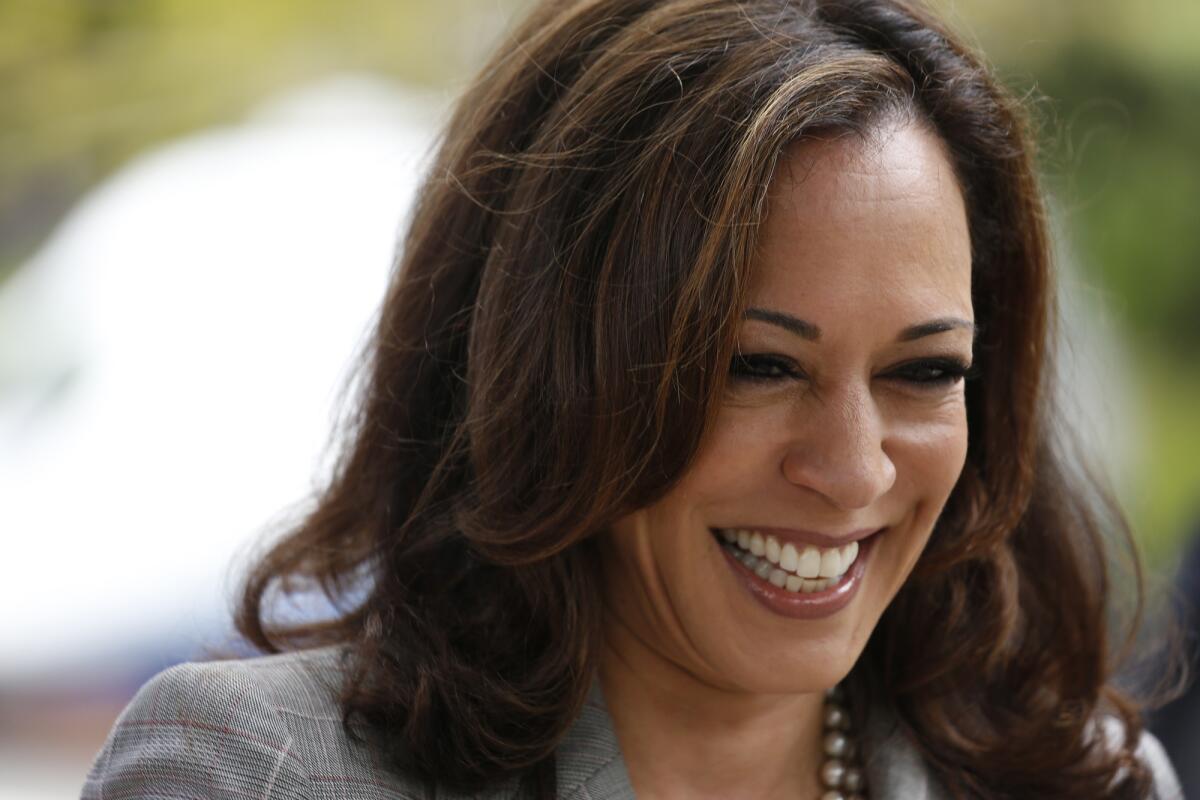Analysis: Kamala Harris strengthened, Loretta Sanchez weak as general election begins, new poll finds

Loretta Sanchez will need a huge infusion of Republican votes to loft ahead of Kamala Harris in the November election and win a seat in the U.S. Senate. The early signs are not good, according to a new poll of voters who cast ballots in California’s June primary.
In the race between the two Democrats, Republicans who plan to vote in November sided more with Atty. Gen. Harris, who took the top spot in Tuesday’s primary, than with Sanchez, the Orange County congresswoman, according to the new USC Dornsife/Los Angeles Times poll. The bulk of Republican respondents — almost two-thirds — said they would not cast ballots for the Senate seat in November.
Overall, in the November runoff, Harris leads Sanchez, 47%-22%, with 26% of respondents saying they would not take part in the election. Harris led among almost all voter groups except for Latinos, who went for Sanchez, 45%-30%, the poll found.
Latinos were Sanchez’s most supportive group in the primary as well. Winning almost four in 10 Latinos allowed Sanchez to grab the second of two slots in the general election, outdistancing several major Republican candidates.
The resulting November race will be the first Democrat vs. Democrat contest for the U.S. Senate to face voters in state history. It’s a consequence of the top-two primary system the state adopted in 2010, in which the first and second finishers move on to the general election, regardless of party.
The all-Democratic lineup also reflects the greatly weakened condition of the Republican Party in the state. The GOP holds no statewide offices, and its members have declined badly as a share of the state’s electorate, a trend that began in the early 1990s as the party antagonized the state’s growing Latino population, and has only accelerated since.
In theory, the odd circumstances could lead to new alliances among the left-out Republicans and different elements of the Democratic Party. But that will only happen, the poll suggested, if Sanchez can substantially redefine herself to voters.
In the primary, Sanchez appeared hobbled by Harris’ strengths among establishment Democrats, women and voters who also had sided with presidential candidate Hillary Clinton. Clinton both drew in and benefited from voters who, further down the ballot, preferred Harris.
Harris won female voters, 45%-19%. She won Democrats, 60%-27%, and prevailed more narrowly among nonpartisan voters who were allowed to cast Democratic ballots, 31%-16%. Clinton supporters went lopsidedly for Harris, 67%-21%, but backers of Clinton rival Sen. Bernie Sanders supported her as well, 42%-30%.
Harris, who is both Asian American and African American, won among white and black voters and also among the overall pool of minority voters that included Asian Americans. (There were too few Asian American voters in the survey to break out their responses separately.)
Sanchez worked during the primary to cast herself as an experienced legislator well-versed in national security and other federal issues with which Harris has far less experience. Harris, who countered with her actions as state attorney general and considerable national star power, had the backing of the state Democratic party.
Together, the two easily defeated 32 other candidates. The third-place finisher was former Republican state party chairman Duf Sundheim. The poll showed Sundheim leading among Republicans and in second place behind Harris among voters age 65 and older, a segment of the electorate that tends to be conservative. Other than that, however, he fell far below the Democrats.
With the contest now tightened to a two-woman race, Harris’ strengths and Sanchez’s difficulties expand. With Harris holding on to a lead of more than 2-1 among Democrats, Sanchez will have to look to nonpartisan voters and Republicans if she is to succeed.
But Harris was winning nonpartisan voters and Republicans, albeit not by the margins she managed among Democrats. Adding to the difficulty for Sanchez: 64% of Republicans, apparently uncomfortable choosing between the other party’s candidates, said they would not cast ballots in the Senate race. Sanchez would have to change their view, as well as expand the pool of voters from the primary, to succeed.
As in the primary, Harris led in the November match-up among all age groups, all races and ethnicities except for Latinos, in all areas of the state and among both supporters of Clinton and of Sanders.
The USC/LA Times poll questioned 1,553 registered voters from June 7-10, including 1,264 who said they voted in the June 7 primary. The poll was conducted online by SurveyMonkey for the USC Dornsife College of Letters, Arts and Sciences and the Los Angeles Times. It has a confidence interval of 4 percentage points in either direction for those who cast ballots.
Twitter: @cathleendecker. For more on politics, go to latimes.com/decker and subscribe to the free daily newsletter.
ALSO
California’s presidential party is over, and here are some lessons
Sanders supporters look for concessions from Clinton, but most will support her--if reluctantly
Updates on California politics
Live coverage from the campaign trail
More to Read
Get the L.A. Times Politics newsletter
Deeply reported insights into legislation, politics and policy from Sacramento, Washington and beyond. In your inbox three times per week.
You may occasionally receive promotional content from the Los Angeles Times.











